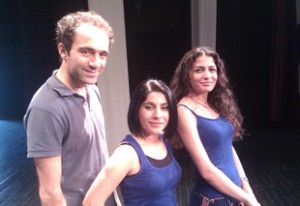(Geschreven voor een Engelstalige site, geen tijd naar het Nederlands te vertalen, sorry.)
A tour of the Kurdish production of a classic play opens a new frontier for the language.
Eager spectators squeezed into whatever standing or sitting room they could find — aisles, stairs — because the theater’s 1,500 seats were all taken. Thunderous applause marked the end of the show as some viewers succumbed to tears.
Theater producer Celil Toksoz still gets goosebumps when he thinks back to the first Kurdish-language performance of “Hamlet” in his native Diyarbakir. He attributed the emotional outpouring to the historic revival the Kurdish language has undergone in recent years as restrictions on its use have been rolled back.

Yavuz Akkuzu (left) plays Hamlet; Rojda Senses (middle) plays Gertrude and Gulseven Medar plays Ophelia. Pic by me, click to enlarge.
“It’s such an important historical play, performed in a language that was fully banned in Turkey for such a long time, and finally this is possible,” Toksoz told SES Türkiye. “It makes people feel like they’re being recognised as Kurds.”
Toksoz and his Amsterdam-based RAST Theatre company, in co-operation with the Diyarbakir city theatre, are behind the ongoing international tour of a Kurdish production of Shakespeare’s classic play. After an autumn stint in the Netherlands, the production made its Turkey premier in Diyarbakir last month. Toksoz’s crew will perform in cities across Turkey before heading for northern Iraq and Germany around February.
For the director, the tour is about more than theatre: it’s a way to develop his mother tongue, which was suppressed in Turkey for decades. Indeed, Toksoz said he got the idea when many years ago he heard a politician said Kurdish “isn’t a real language you could perform ‘Hamlet’ in.”
“It became a dream to produce a Kurdish ‘Hamlet’,” Toksoz told SES Türkiye.
Language of civilization
A more permissive attitude towards Kurdish has prevailed in recent years. The most restrictive bans were lifted in 1991, and as part of Turkey’s EU membership bid, private Kurdish courses opened in the early years of the the AKP’s tenure.
Elective language classes in secondary schools introduced by the government earlier this year allow students to study Kurdish for two hours a week. A state Kurdish-language TV channel has aired since 2009. But because the language was stifled for much of Turkey’s history and Turkish is still the medium of instruction in public schools, some Kurds still struggle with the language.
In a television interview earlier this year, Deputy Prime Minister Bulent Aric said the government was opposed to full education in Kurdish.
“Even if there was no constitutional obstruction, do you think education in Kurdish would be of good quality? Is Kurdish language of civilisation?” Arinc said. “We’re not thinking of any mother tongue education like that. Turkish as the language of instruction secures unity, and Turkish is also a language of civilisation.”
Some linguistic trouble
Translator Kawa Nemir told SES Türkiye the “Hamlet” production team had some linguistic trouble.
“Kurds are not educated in Kurdish, so there is a lack of understanding of their own language,” Nemir said, adding that some actors didn’t understand some words in the script. ”That’s a sign that it is probably more difficult for the audience, so I adjusted the language by using more commonly used words,” Nemir added.
Firat, 21, said he struggled at some points of the Diyarbakir performance, but that didn’t take away from his experience.
“I didn’t know all the words, but I didn’t mind; the feeling came across 100 percent,” said the university student who attended the Diyarbakir performance. “In daily life, Kurdish is not as advanced as in this play.”
In light of these difficulties, Toksoz and other Kurds have taken the initiative to revive and enrich their language. An increasing number of projects, like his, aim to develop the language in areas outside of daily life, such as theater and science.
“The people, the history, the language, a people that still wonders who they are, if they can be or not be who they are. My home city, that’s what I have been working for,” the artist, who grew up in Turkey but spent most of his adult life in the Netherlands, told SES Türkiye.
A fiery speech on Kurdish rights
The play has been warmly received elsewhere in Turkey, including an Ankara performance attended by Minister of Culture Ertugrul Gunay, CHP Vice Chairman Sezgin Tanrikulu, and BDP co-chair Gultan Kisanak.
“That’s recognition too, that representatives from all these parties were there,” Toksoz said. “I talked to the minister of culture. He said the play as we performed it suited ‘Hamlet’ and the Kurdish people very well.”
The tour hasn’t all been smooth sailing. Perhaps unsurprisingly, it has become entangled with politics at certain points. Two people unveiled pro-Kurdish banners on the stage in Diyarbakir as the audience delivered a standing ovation; the applause grew louder.
Diyarbakir Metropolitan Mayor Osman Baydemir thanked the actors for their performance before launching into a fiery speech on Kurdish rights.
Toksoz dismissed the controversy. ”I was asked several times why there is politics around the play. It wasn’t my intention, but it’s just what happens,” he told SES Türkiye.
“It’s unavoidable, since the Kurdish issue is part of people’s daily lives,” Toksoz added. “The play gives people an opportunity to express themselves, and there’s nothing wrong with that.”


Recente reacties